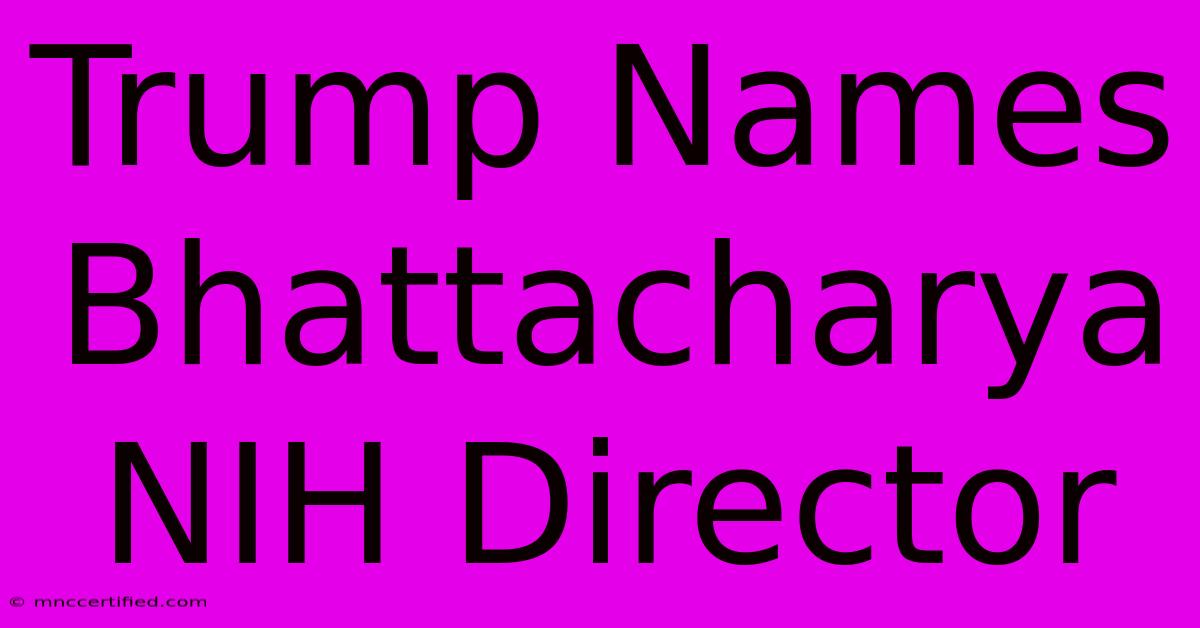Trump Names Bhattacharya NIH Director

Table of Contents
Trump Names Bhattacharya NIH Director: A Deep Dive into the Appointment and its Implications
Keywords: Bhattacharya, NIH Director, Trump administration, National Institutes of Health, scientific leadership, political appointment, controversy, public health, research funding, scientific integrity
On [Date of Appointment], the Trump administration announced the appointment of [Bhattacharya's Full Name] as the Director of the National Institutes of Health (NIH). This appointment sparked considerable debate and raised significant questions regarding the political influence on scientific leadership and the future direction of biomedical research in the United States. This article delves into the details of the appointment, exploring the background of the appointee, the controversies surrounding the decision, and the potential implications for the NIH and the broader scientific community.
Bhattacharya's Background and Qualifications
[Bhattacharya's Full Name]’s background prior to the appointment needs detailed exploration here. Include specifics such as:
- Education and Training: List degrees, relevant institutions, and areas of specialization. Mention any prestigious fellowships or awards received.
- Professional Experience: Detail previous positions held, focusing on roles relevant to biomedical research, public health, or administration. Highlight significant accomplishments and publications.
- Areas of Expertise: Specify Bhattacharya's core scientific expertise. Mention any specific contributions to the field that are noteworthy.
The Controversy Surrounding the Appointment
The appointment of [Bhattacharya's Full Name] was not without its critics. Key controversies should be detailed, including:
- Political Affiliation and Alignment with Trump's Policies: Analyze Bhattacharya's known political leanings and how they might influence NIH priorities. Discuss any instances where their views aligned or clashed with Trump administration policies on health, science, or other matters.
- Lack of Traditional NIH Leadership Experience: Assess whether Bhattacharya's background adequately prepared them for leading such a large and complex organization as the NIH. Compare their experience to that of previous directors.
- Concerns about Scientific Integrity and Independence: Discuss any concerns raised regarding the potential for political interference in NIH research funding and the integrity of the scientific process under Bhattacharya's leadership. This section should include quotes from experts and news articles.
Implications for the NIH and Biomedical Research
The appointment's implications for the NIH and broader biomedical research warrant a thorough investigation:
- Impact on Research Funding and Priorities: Analyze how Bhattacharya’s leadership could shift research funding priorities, potentially favoring certain areas while neglecting others. Discuss potential impacts on specific research programs and initiatives.
- Effect on Scientific Collaboration and International Relations: Evaluate the potential effects on collaborations with other research institutions domestically and internationally. Consider how the appointment might affect the reputation and global standing of the NIH.
- Long-Term Impact on Public Health: Explore how the changes implemented under Bhattacharya's leadership might ultimately affect public health outcomes. This section needs detailed analysis and prediction based on the available information.
Conclusion: Looking Ahead
The appointment of [Bhattacharya's Full Name] as NIH Director marked a significant moment for the agency and the broader scientific community. This appointment, steeped in controversy, has significant implications for the future direction of biomedical research in the United States. Further monitoring of the NIH's activities and policies under Bhattacharya's leadership is crucial to assess the long-term impact of this decision. Future research should focus on the specific policy changes implemented and their resulting effects on various aspects of the NIH's operations. Analyzing the perspectives of various stakeholders—scientists, policymakers, and the public—will provide a comprehensive understanding of the consequences of this impactful appointment.
Note: Remember to replace the bracketed information with accurate details regarding the specific individual and events. Thoroughly research and cite all sources used to ensure accuracy and credibility. This framework provides a robust foundation for a well-optimized and informative article. Remember to use relevant internal and external links to enhance SEO.

Thank you for visiting our website wich cover about Trump Names Bhattacharya NIH Director. We hope the information provided has been useful to you. Feel free to contact us if you have any questions or need further assistance. See you next time and dont miss to bookmark.
Featured Posts
-
Unconscionable Arbitration Delegation Clause
Nov 27, 2024
-
Gofundme Is Not Life Insurance
Nov 27, 2024
-
Barca Academy Pro Ny Financial Overview
Nov 27, 2024
-
Ticketmaster Antitrust Lawsuit Arbitration
Nov 27, 2024
-
Hibs Points Shared Six Goal Game
Nov 27, 2024